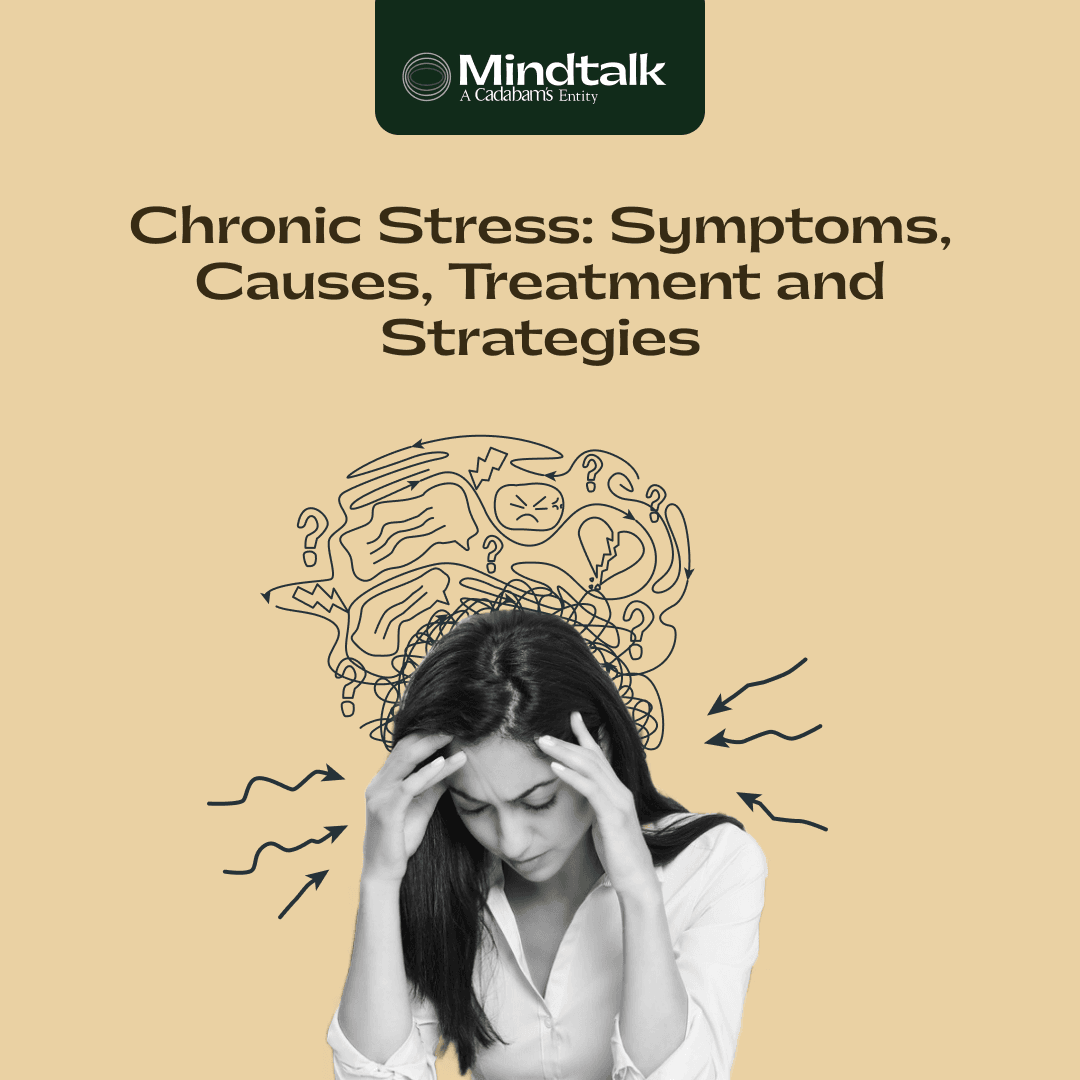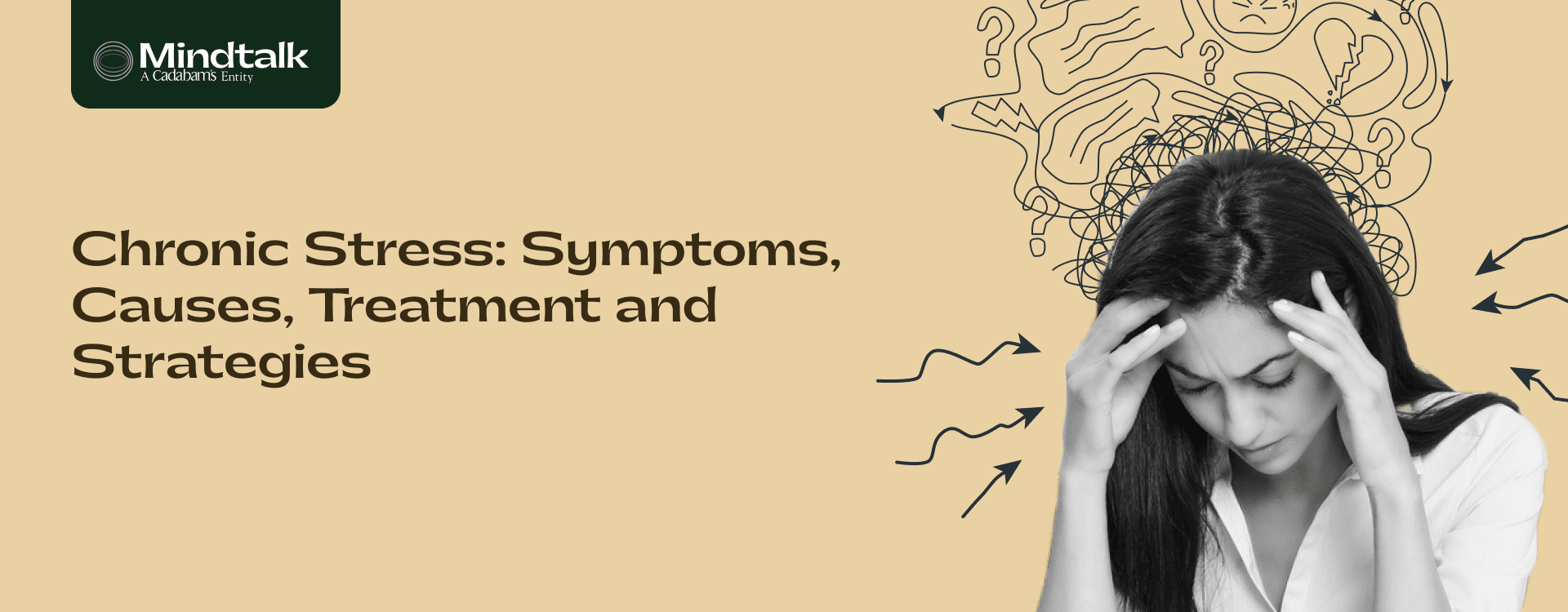Chronic Stress Explained: Key Symptoms, Underlying Causes, And Practical Treatments

Stress is the body's natural response to challenging situations or events, triggering the release of hormones like cortisol and adrenaline. It helps keep us alert and prepared to face immediate dangers. However, chronic stress symptoms arise when this response becomes prolonged, leaving the body in a constant state of tension. Over time, this can lead to mental, emotional, and physical exhaustion, making it essential to consider treatments for chronic stress and effective stress management techniques to restore balance.
What Is Chronic Stress?
Chronic stress is a condition that can negatively affect your physical and mental health. It can be overwhelming and make you feel like you are stuck in a combat situation for a long time, even when there is no threat. Over time, it exhausts your body and mind, disrupting daily life. This prolonged stress response may lead to chronic stress symptoms such as fatigue, irritability, and weakened immunity, making it vital to understand how to deal with chronic stress and adopt effective stress management techniques to regain a sense of control and well-being.
Prevalence Of Chronic Stress
Chronic stress is increasingly prevalent, with studies showing that a significant percentage of adults experience it due to modern life pressures. Factors such as workplace demands, financial instability, and societal expectations contribute to this rise. Understanding its prevalence highlights the importance of addressing chronic stress symptoms and exploring treatments for chronic stress.
How Does Chronic Stress Differ From Acute Stress?
Acute stress is the stress experienced from minor inconveniences that we come across daily, such as traffic jams, criticism from the boss, loud noises, or losing essential items. Our body and mind recover from the stress once the situation passes and comes back to normalcy. Chronic stress has various root causes which linger in your mind for a longer time. You suffer from chronic stress symptoms that affect your personal life deeply, such as relationship issues, traumatic experiences, and a toxic work environment. Both types of stress affect physical and mental health, but chronic stress affects with more intensity and stays long-term, and requires targeted treatments for chronic stress and effective stress management techniques to alleviate its effects. By understanding how does chronic stress differ from acute stress? Individuals can adopt suitable stress management techniques to address their unique needs.
Causes of Chronic Stress
Stress can creep in from any direction and cause havoc on your physical and mental well-being. There are various causes of stress, but specific triggers will vary depending on the individual.
Financial Troubles
Bill payments, debts, and household expenses can keep you awake at night, causing stress and worry. Tight finances can make you feel like you have lost control over your life and are unable to spend money when needed. Money can also put a strain on relationships, causing emotional turmoil. Prolonged financial stress can lead to significant chronic stress symptoms and weaken your immune system. Considering treatments for chronic stress caused by financial struggles is crucial for maintaining health and balance.
Relationship Difficulties
Relationship issues can put you through emotional turmoil, which can be exhausting. It can trigger emotions like anger, sadness, anxiety, and loneliness and hamper your self-esteem.
Constant fights, disagreements, or a lack of commitment can create a sense of instability. These unresolved issues often lead to chronic stress symptoms, making it essential to learn how to deal with chronic stress arising from interpersonal conflicts.
Retirement
Retirement can cause an identity crisis, which can lead to anxiety and a sense of purposelessness. Living on a pension or savings can create financial worries, which is a constant stressor. Leaving the workplace can make you feel socially isolated. Aging often brings chronic health issues, adding another layer of stress to retirement.
Workplace Stress
Workplace stress is a significant contributor to chronic stress symptoms in today’s fast-paced environment. Long hours, heavy workloads, and high expectations often lead to burnout and frustration. A toxic work environment or job insecurity can add to the strain, making it difficult to focus or maintain productivity. To combat this, adopting stress management techniques and seeking balance can help mitigate long-term effects.
Health-Related Challenges
Chronic illnesses or ongoing health concerns can be a relentless source of stress. Conditions like diabetes, heart disease, or autoimmune disorders require constant attention, adding physical and emotional burdens. Financial worries from medical expenses or uncertainty about health outcomes amplify the causes of chronic stress. Addressing these issues with effective treatments for chronic stress can alleviate the pressure and improve overall well-being.
Family Responsibilities
Balancing family responsibilities can be overwhelming and lead to chronic stress symptoms. Caring for children, managing household tasks, or supporting ageing parents can result in emotional and physical exhaustion. The pressure of meeting everyone’s needs often leaves little time for self-care, highlighting the importance of adopting stress management techniques to maintain a healthier life balance.
Understanding the causes of chronic stress is crucial for adopting effective stress management techniques and improving overall well-being.
Recognising Signs And Symptoms Of Chronic Stress
Chronic stress affects the whole body and has various physical and psychological symptoms that affect daily life and make normal functioning difficult. However, the severity of chronic stress symptoms differs depending on the individual and circumstances. When considering how does chronic stress differ from acute stress? Recognising symptoms of chronic stress can help differentiate it from short-term stress. Following are some of the prominent signs and symptoms of chronic stress that one may experience:
Psychological Signs Of Chronic Stress
When you are stressed, your mind suffers a lot, and various psychological symptoms start surfacing. Persistent worry can intensify the feeling of anxiety. Prolonged stress can show depressive signs like hopelessness, sadness, or loss of interest. Individuals become more prone to mood swings and irritability, which can lead to insomnia. They face difficulty in concentrating and have memory retention capabilities that get hampered.
Emotional Signs Of Chronic Stress
An individual suffering from chronic stress can be seen as demotivated and have a negative outlook on life. They cannot find pleasure in activities and are more susceptible to mood swings and irritability. Daily tasks become overwhelming for them, making it difficult for them to manage minor stressors. They get emotionally drained and isolate themselves from social interactions. Identifying these signs is vital in understanding how to deal with chronic stress and regaining emotional well-being.
Physical Signs Of Chronic Stress
Chronic stress often leads to muscle tension, causing headaches, neck pain, and back pain. Gut health is also affected by stress, leading to indigestion and changes in bowel movements. Stress increases blood pressure and heart rate, elevating the occurrence of cardiovascular problems. Stress eating or loss of appetite is associated with chronic stress that leads to weight change. Various other problems like hair loss, weak immune system, and skin problems can be seen. Addressing these chronic stress symptoms with appropriate treatments for chronic stress can help reduce the physical toll on the body.
Behavioural Signs Of Chronic Stress
Nail biting, fidgeting, and pacing are common behavioural signs of stress. Individuals become restless, frustrated, and aggressive with chronic stress. They lose interest in their hobbies, distance themselves from social interactions, and procrastinate their work. Some even resort to substances to cope with emotions. Eating habits may also change, such as overeating or undereating, and all these chronic stress symptoms indicate the need for effective stress management techniques.
Neurological Symptoms Of Chronic Stress
Chronic stress often causes frequent headaches, migraines, and dizziness due to prolonged tension and disrupted blood flow. Tingling sensations or numbness may also occur, highlighting the nervous system's response to chronic stress symptoms and its long-term effects.
Hormonal Changes Linked To Chronic Stress
Chronic stress disrupts hormone levels, causing irregular menstrual cycles in women and reduced testosterone in men. These imbalances lead to fatigue, mood swings, and weakened immunity, underscoring the need for effective stress management techniques to restore hormonal balance and health.
Sleep Disturbances As A Symptom Of Chronic Stress
Chronic stress frequently causes insomnia or poor-quality sleep, making it hard to fall or stay asleep. Sleep deprivation intensifies chronic stress symptoms, leading to exhaustion, irritability, and difficulty concentrating, emphasising the importance of exploring treatments for chronic stress.
Recognising these chronic stress symptoms is critical for early intervention and adopting effective stress management techniques to maintain mental and physical health.
Impact of Stress on Health and Well-Being
Stress affects various aspects of life, including physical health, emotional well-being, and relationships. Understanding these impacts is essential for adopting effective stress management techniques.
- Physical Effects: Increases blood pressure, causes headaches, weakens the immune system, and leads to chronic illnesses like heart disease.
- Mental Effects: Triggers anxiety, depression, memory issues, and difficulty concentrating, making it harder to handle daily responsibilities.
- Emotional Effects: Causes mood swings, irritability, and feelings of helplessness, impacting overall happiness and satisfaction with life.
- Behavioural Effects: Promotes unhealthy habits like overeating, smoking, or substance use and leads to procrastination or withdrawal from social activities.
- Social Effects: Strains relationships, reduces communication, and creates feelings of isolation or loneliness.
Recognising the effects of chronic stress symptoms highlights the importance of exploring treatments for chronic stress and maintaining mental and physical health.
Coping Mechanisms For Chronic Stress And How To Avoid Long-Term Stress
For the prevention or management of chronic stress, various healthy habits, effective coping mechanisms, and a supportive environment need to be adapted to life. Let us have a look at some of such effective coping mechanisms and management techniques:
Practice Mindfulness
This is an effective practice to manage stress, as mindfulness helps us be present in the moment, making us more conscious of ourselves and our surroundings without any judgment. It helps us cultivate a sense of calm and awareness. To practice mindfulness, you can try meditation, slow walks with sensing each step, or just closing your eyes and paying attention to body parts. Incorporating mindfulness regularly is one of the most effective stress management techniques for dealing with chronic stress symptoms.
Set Attainable Goals
Setting goals provides a structured and measurable approach to improving overall well-being, but if you are chronically stressed, limiting your goals can be a relief. Start small and break down tasks so you can manage each step, which will help you achieve your aim easily. This will boost your confidence and keep you motivated. Identify any stressors which will help you address the root cause of the stress. Be flexible with work, always adapt and adjust accordingly. This approach can be instrumental in learning how to deal with chronic stress effectively.
Practice Self-Compassion
Treating yourself with kindness and understanding, especially during a stressful situation, will help you manage chronic stress. Avoid any self-criticism or negative self-talk, and try to use supportive and encouraging language. Developing self-affirmations will reinforce your self-worth and ability to cope with stressful situations. Practising self-compassion is a vital part of treatments for chronic stress, as it helps create a positive outlook during tough times.
Develop A Strong Support System
Building a strong support system is crucial for managing chronic stress symptoms effectively. Surround yourself with positive and understanding individuals, such as family members, friends, or support groups, who can provide emotional encouragement during tough times. Talking about your stressors and seeking advice helps alleviate feelings of loneliness and isolation. Engaging with a support system also offers practical solutions, making it easier to learn how to deal with chronic stress.
Healthy Lifestyle Changes
Adopting healthy lifestyle changes is a key element in stress management techniques. Regular exercise, such as walking, yoga, or swimming, helps release endorphins, reducing stress levels. Eating a balanced diet rich in nutrients strengthens your immune system, preventing health complications caused by chronic stress. Additionally, prioritising sleep by maintaining a consistent bedtime routine improves overall well-being. These changes can complement treatments for chronic stress, enhancing both mental and physical health.
Practising the above are essential stress management techniques for overcoming chronic stress symptoms.
Effective Therapies and Treatment for Chronic Stress Management
There are several effective therapies and treatments to manage chronic stress, but the choice of therapy and treatment depends on the individual’s cause of stress and any specific needs of the person.
Cognitive-Behavioural Therapy (CBT)
This therapy teaches you coping strategies against any situations, thoughts, or behaviours that lead to stress. It helps to identify and challenge the negative thoughts, replacing them with more optimistic ones. CBT, widely regarded as one of the most effective treatments for chronic stress, also equips you with relaxation techniques such as deep breathing, progressive muscle relaxation, and mindfulness meditation to effectively manage stress. It teaches you how to break down overwhelming problems into actionable steps. CBT encourages healthy habits like regular exercise, a balanced diet, and sleep hygiene.
Dialectical Behaviour Therapy (DBT)
This therapy helps you face your fear with courage. It helps to acknowledge the validity of your emotions, even if they’re intense or negative and emphasises acceptance of your current situation. DBT teaches you mindfulness, which involves observing your thoughts and feelings without judgment. It helps you gain perspective and avoid impulse behaviours. It also helps you learn how to regulate your emotions and identify triggers to develop coping skills.
Relaxation Therapy
This therapy comprises various techniques that help in chronic stress treatment. It involves meditation, which teaches you various breathing exercises to regulate your stress and anger. This also includes yoga, which is a combination of physical and breathing exercises that promotes relaxation and reduces stress. A very uncommon practice yet very effective, Tai Chi is a gentle form of exercise combining slow, graceful movements focused on breathing. Some other relaxation techniques include listening to music, guided imagery, and nature time. By including these practices in your daily life, you can reap the benefits of one of the best stress management techniques for long-term relief.
Medication For Chronic Stress
Medication can be an effective option for managing chronic stress symptoms. Doctors may prescribe antidepressants, anti-anxiety medications, or beta-blockers to address stress-related conditions. These treatments, combined with stress management techniques, provide relief and support overall mental well-being.
Alternative Therapies
Alternative therapies like acupuncture, aromatherapy, and herbal remedies are gaining popularity for chronic stress treatment. Practices such as yoga tai chi, and mindfulness meditation complement conventional approaches, offering holistic ways to learn how to deal with chronic stress effectively.
Combining effective therapies, medications, and alternative treatments provides comprehensive solutions for managing chronic stress symptoms and improving your well-being.
Empower Yourself to Overcome Chronic Stress with Mindtalk
At Mindtalk, we offer therapies and equip individuals with effective coping mechanisms to tackle the adversities of chronic stress. We understand how difficult it is to deal with stress on a daily basis. Our expert therapists will help you get back on track and lead a happy, fulfilling life. So reach out to Mindtalk if it has become too hard for you to handle stress on your own. We are here to support you and take you on the journey of self-acceptance.
If you're seeking solutions for emotional and mental well-being, Mindtalk’s Chronic Stress Therapists are here to help. Our platform offers comprehensive mental health services, including counselling, therapy, and psychiatric care, provided by specialised experts. With a focus on evidence-based and holistic approaches, we support your path to personal growth and healing. Reach out to us today to book a therapy session. Call us at +91 73534 00999
Mental Health Professional For Stress



